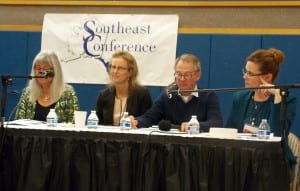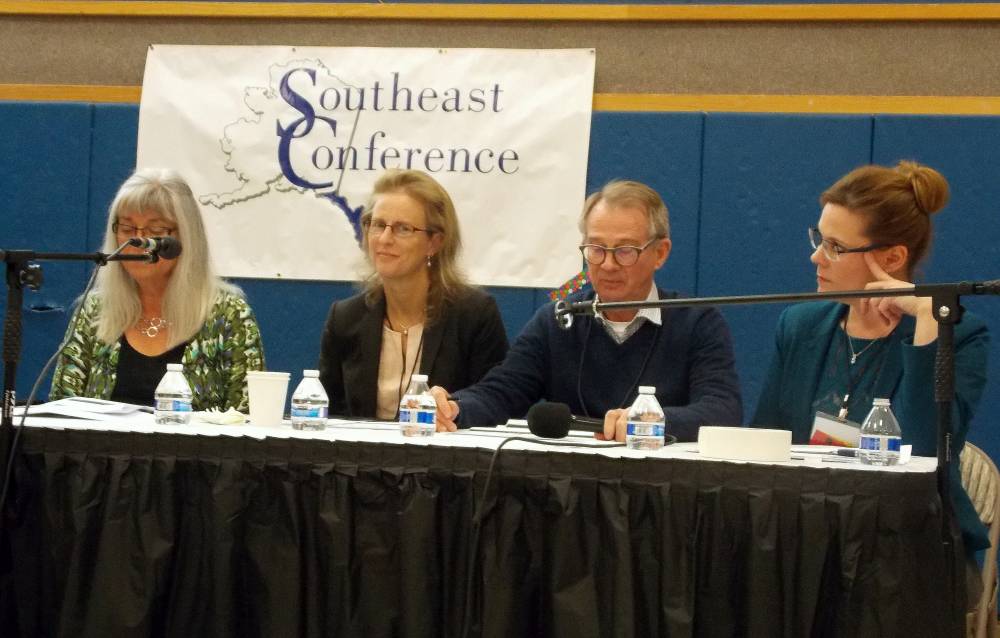
The Maritime Works panel sits in front of the Southeast Conference gathering, Sept. 20, in Petersburg. (from left) Kris Norosz, Julie Decker, Doug Ward, Cari Ann Carty. Photo/Angela Denning
A commercial for APICC plays on a big screen at the front of the conference showing industrial workers in the Alaska frontier.
APICC is the Alaska Process Industry Careers Consortium. It’s a group led by big businesses and corporations training Alaskans for jobs within the state: companies in oil and gas, mining, and water and waste water industries.
Maritime Works is a group of maritime industry businesses that has recently partnered with APICC.
Kris Norosz is with Maritime Works. She does government relations for Icicle Seafoods in Petersburg.
“I knew that we needed to come together to do something,” Norosz said. “As employers we noticed that we had a lot of skilled jobs but not a lot of skilled Alaskans to fill those jobs. So we knew we had a problem because it was absolutely crucial to our operations that these skilled positions are filled.”
She gave the example of her Petersburg plant, which employs hundreds of seafood workers every year.
“If we don’t have a can machinist we’ve got hundreds of people out of work in the summer while the salmon is stacking up and it’s a disaster,” she said.
The same thing could happen without electricians, refrigeration engineers, and other jobs that deal with fisheries or ships. Norosz says there’s also an aging workforce with limited younger workers ready to take over those skilled jobs.
Julie Decker is with Maritime Works as the Executive Director for the Alaska Fisheries Development Foundation in Wrangell.
“We’re working toward high dollar, blue collar careers in the maritime industry that work for both employees and employers and that’s really the crux of it,” Decker said.
Decker says there is a growing awareness in the state of the importance of the maritime industry.
Joining with APICC gives Maritime Works the opportunity to partner with state agencies, the University of Alaska and training providers. APICC was formed about 17 years ago and started a two-year process technician degree program at several state campuses.
Since then they’ve seen hundreds of graduates. Cari Ann Carty is the Executive Director of APICC. She says on average those AA graduates are making $105,000 salaries five years into the job.
“We work with the training programs that are already in place,” Carty said. “We don’t try to recreate the wheel or make a new organization, all the really great training programs that are already out there and just kind of make those really industry specific.”
Doug Ward is with Maritime Works through Ketchikan’s shipyard, Vigor Alaska. He says their approach is different than other workforce development projects.
“It’s jobs driven,” Ward said. “It’s got employers in the wheel house of workforce investment and that’s a brand new turn of events.”
He says the Maritime industry will be partnering with school districts and tribes in the region to expand technical training possibilities.
In the future Maritime Works hopes to grow new jobs such as advanced manufacturing and seafood processing, looking at ways to use fish waste for things like supplements and cosmetics.












